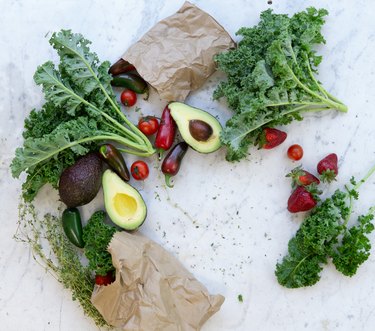
When it comes to eating healthy and the effects that this has on your body, you usually think of your internal organs and physique. How will this affect my liver? My heart? My stomach? All of these are important questions to ask — but how often do you consider the effect your diet has on your eyesight?
What Is Glaucoma?
Video of the Day
Glaucoma is a condition involving damage to the optic nerve that can result in gradual loss of sight and potential blindness. It's the second leading cause of blindness worldwide with more than 65 million sufferers worldwide as of 2018.
Video of the Day
Even though there isn't a direct link between high eye pressure and the development of glaucoma, it's a high-risk factor that needs to be considered. In addition to eye pressure, both blood pressure and diabetes are risk factors for glaucoma, so being mindful of your diet is essential in preventing any deterioration in your eyesight.
In spite of the possible serious consequences of having high eye pressure, it isn't as hard as you may think to reduce it. It can simply involve eating the right foods in the right quantities.
Read more: How to Reverse Glaucoma
Foods That Reduce Eye Pressure
Fruits and vegetables are a great place to start. Dr. Yvonne Ou of the University of California Medical Center advises that a higher intake of all fruits and vegetables will benefit your whole body, including eye health, blood pressure and diabetes, all of which may affect eye pressure and contribute to the development of glaucoma.
In particular, increase your intake of cabbage, peaches, green beans, spinach, kale and beets. Glaucoma specialist Dr. Amish Doshi writes that these foods contain high levels of carotenoids, which offer great benefits for your visual health and make excellent choices if you're looking for foods that reduce eye pressure.
In addition, Dr. Doshi notes that foods high in vitamins A and C, such as carrots, radishes, Brussels sprouts and celery, are also great for your eyes and may serve as beneficial foods that reduce eye pressure.
Antioxidant-Rich Foods
Oxidative stress is another important factor when thinking about your eye pressure. A 2018 study published in the journal Current Neuropharmacology found a link between oxidative stress and the risk of developing glaucoma. This may happen when there is an imbalance in the body between free radicals produced and the antioxidants required to neutralize them.
One way to reduce oxidative stress is to increase the number of antioxidant-rich foods you eat so your body can better handle free radical production. The more balance in your body, the less stress and the less eye pressure putting you at risk of glaucoma and other health concerns. Dr. Doshi lists the best antioxidant-rich foods as pomegranate, acai berries, cranberries and even dark chocolate.
Read more: How Much Antioxidants in a Day?
Beyond Fruits and Veggies
Achieving a beneficial diet doesn't necessarily involve eating only produce. You actually have lots of choices when it comes to adding foods to your diet that can help reduce eye pressure:
- Foods rich in vitamin E, such as eggs, wheat germ and nuts
- Foods rich in zinc, such as red meat, poultry and seafood (particularly oysters)
- Foods rich in protein, such as unsalted nuts, soy foods and Greek yogurt
There are many ways you can reduce the risk of high eye pressure through a balanced diet of vegetables, meats and seafood. Eating healthy for your eyes doesn't have to be boring.
Tip
Meal suggestion: Why not try half a rotisserie chicken without skin along with colorful cooked vegetables? This meal is a great source of both protein and vitamin A, important components of foods that reduce eye pressure.
Read more: Nutrition Information of Rotisserie Chicken
- Glaucoma Research Foundation: What Vitamins and Nutrients Will Help Prevent My Glaucoma From Worsening?
- Bright Focus Foundation: Can Eating Leafy Green Vegetables Lower Glaucoma Risk?
- International Journal of Yoga: Effect of Yoga-Based Ocular Exercises in Lowering of Intraocular Pressure in Glaucoma Patients
- Mutation Research: The Role of Oxidative Stress in Glaucoma
- Medical News Today: How Does Oxidative Stress Affect the Body?
- IngentaConnect: Current Neuropharmacology: Strategies to Reduce Oxidative Stress in Glaucoma Patients
Is this an emergency? If you are experiencing serious medical symptoms, please see the National Library of Medicine’s list of signs you need emergency medical attention or call 911.